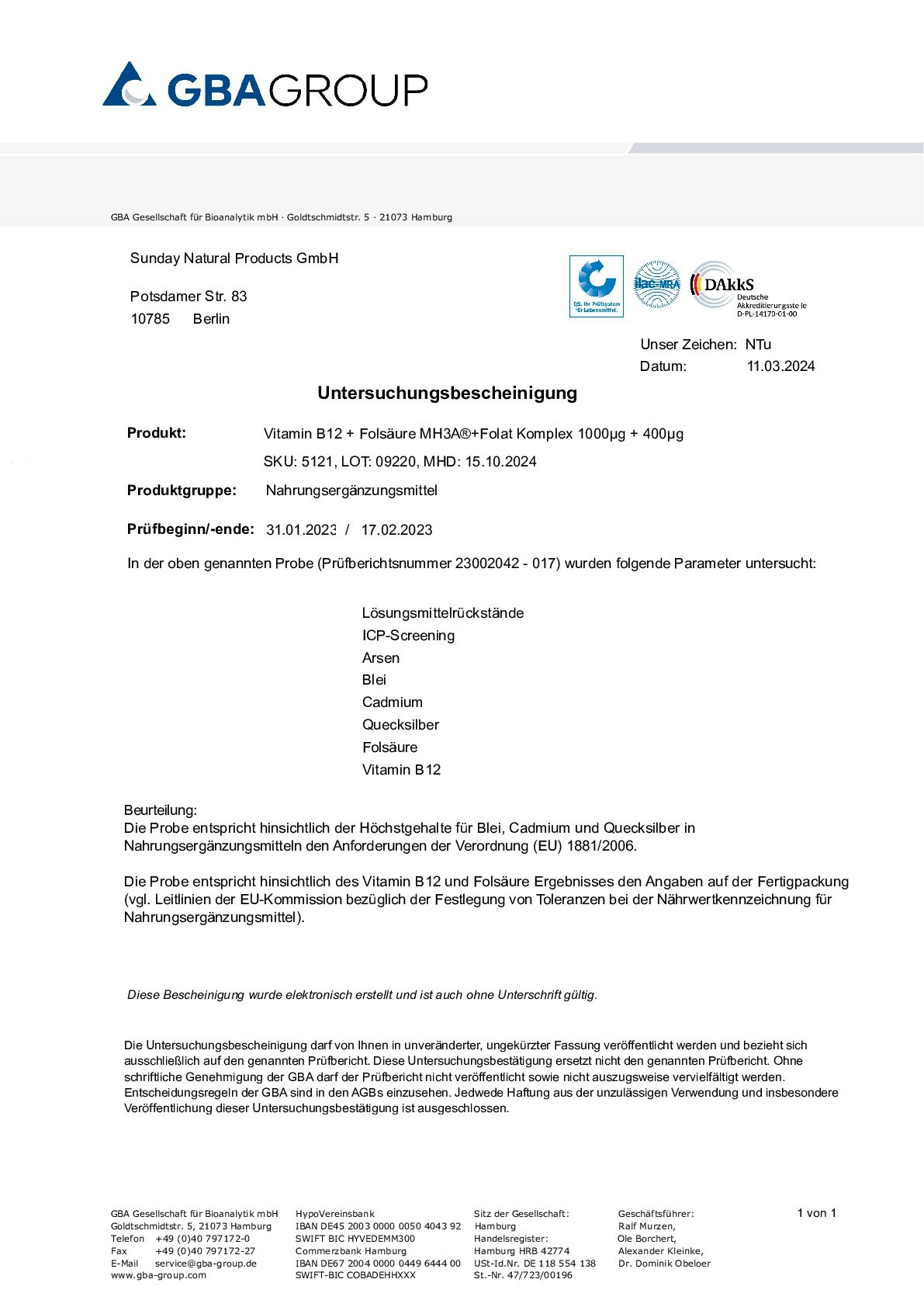Vitamin B12 (Cobalamin)
Vitamin B12 fulfils a number of important functions in the body. Among other things, it can help to reduce tiredness and fatigue and maintain a normal energy metabolism. It contributes to the normal functioning of the psyche, immune and nervous systems, supports the formation of red blood cells and is beneficial for normal homocysteine metabolism. The body also needs vitamin B12 for cell division. Vitamin B12 acts as a so-called coenzyme in the body, meaning it is necessary for certain enzymes in our body to fulfil their tasks. The associated reactions are directly dependent on vitamin B12 and cannot take place without the vitamin.
Vitamin B12 MH3A® Formula
Vitamin B12 (cobalamin) occurs in a variety of different chemical structures, all of which perform different tasks in the body. The natural forms of vitamin B12, which can exert a direct effect on the body, are considered bioactive coenzymes. Synthetic forms of vitamin B12, such as cyanocobalamin, must first be converted into a natural form by the body in order to be effective.
Methylcobalamin and adenosylcobalamin are the bioactive coenzyme forms of vitamin B12. Because they each have different areas of action and take part in completely different reactions, the body is able to convert these forms from one to the other. Methylcobalamin plays a role in the methylation cycle within the cell plasma, a far-reaching function influencing various body processes from blood cell synthesis to the functioning of the nervous system. Adenosylcobalamin, on the other hand, takes effect in the mitochondria, the powerhouse of the cell. There it plays a role in the citrate cycle, the central metabolic cycle for energy production. The third natural form of vitamin B12 is hydroxocobalamin, a form which can be found in many foods. It makes up a significant amount of the total B12 in the blood and binds particularly well to vitamin B12 transport molecules. It is thus not excreted as quickly; hydroxocobalamin is the form of B12 with the highest capacity for building long-term stores in the body and can be easily converted into either of the two active coenzyme forms as needed.
Vitamin B9 Folate (Folic Acid)
Folate, also known as vitamin B9, is involved in a variety of important body functions. This essential vitamin contributes to energy metabolism, it can reduce fatigue and tiredness and it supports the immune system as well as mental functioning. It is required for haematosis, cell division, homocysteine metabolism and forming amino acids. Folate also plays a role in the growth of maternal tissue during pregnancy.
Synthetic folic acid must first be converted into folate in order to be bioactive. This conversion cannot always proceed in the body without issue, as a number of cofactors and enzymes are necessary for it to occur. The optimal, biologically active form of folate is called L-methylfolate (or, more precisely, L-5-methyltetrahydrofolate, or L-5-MTHF). L-methylfolate is an important methyl donor and an essential component of the methylation cycle.
Health Benefits of Vitamin B12
According to the European Food Safety Authority (EFSA), vitamin B12 contributes to:
- Normal energy metabolism
- Normal nervous system functioning
- Normal homocysteine metabolism
- Normal cognitive function
- Normal erythropoiesis
- Normal immune system functioning
- The reduction of tiredness and fatigue
- Cell division
According to the European Food Safety Authority (EFSA):
Folate contributes to:
- The growth of maternal tissue during pregnancy
- Normal amino acid synthesis
- Normal hemopoiesis
- Normal homocysteine metabolism
- Normal cognitive function
- Normal immune system functioning
- The reduction of tiredness and fatigue
- Cell division
























